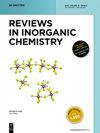In-vitro anticancer profile of recent ruthenium complexes against liver cancer
IF 3.1
3区 化学
Q1 CHEMISTRY, INORGANIC & NUCLEAR
引用次数: 1
Abstract
Abstract Ruthenium complexes are considered as the most favorable alternatives to traditional platinum-based cancer drugs owing to their acceptable toxicity level, selectivity, variant oxidation states and ability to treat platinum-resistant cancer cells. They have similar ligand exchange kinetics as platinum drugs but can be tailored according to our desire by ligands influence. In the current study, we illustrate the in-vitro anticancer profile of some ruthenium complexes (2016–2021) against human hepatocellular carcinoma (HepG2). The anticancer activity of ruthenium complexes is determined by comparing their IC50 values with one another and positive controls. Fortunately, some ruthenium complexes including 3, 4, 6, 14, 15, 20, 42, and 48 exhibit surpassed in-vitro anticancer profile than that of positive controls promising as potential candidates against liver cancer. We also explored the structure-activity relationship (SAR) which is a key factor in the rational designing and synthesis of new ruthenium drugs. It covers the factors affecting anticancer activity including lipophilicity, planarity, area and bulkiness, the steric influence of different ligands, and electronic effects induced by ligands, stability, aqueous solubility and bioavailability to the target sites. The data reported here will provide strong support in the plausible design and synthesis of ruthenium anticancer drugs in the upcoming days.钌配合物抗肝癌的体外抗癌研究进展
摘要钌配合物被认为是传统的基于铂的癌症药物的最有利的替代品,因为它们具有可接受的毒性水平、选择性、可变氧化态和治疗铂耐药性癌症细胞的能力。它们具有与铂类药物相似的配体交换动力学,但可以根据我们的愿望通过配体的影响进行定制。在目前的研究中,我们阐明了一些钌配合物(2016-2021)对人类肝细胞癌(HepG2)的体外抗癌作用。钌配合物的抗癌活性是通过将它们的IC50值彼此和阳性对照进行比较来确定的。幸运的是,一些钌配合物,包括3、4、6、14、15、20、42和48,表现出超过阳性对照的体外抗癌特性,有望成为癌症的潜在候选物。我们还探讨了结构-活性关系(SAR),这是合理设计和合成钌新药的关键因素。它涵盖了影响抗癌活性的因素,包括亲脂性、平面性、面积和体积、不同配体的空间影响、配体诱导的电子效应、稳定性、水溶性和对靶位点的生物利用度。本文报道的数据将在未来几天为钌抗癌药物的合理设计和合成提供有力支持。
本文章由计算机程序翻译,如有差异,请以英文原文为准。
求助全文
约1分钟内获得全文
求助全文
来源期刊

Reviews in Inorganic Chemistry
化学-分析化学
CiteScore
7.30
自引率
4.90%
发文量
20
审稿时长
1 months
期刊介绍:
Reviews in Inorganic Chemistry (REVIC) is a quarterly, peer-reviewed journal that focuses on developments in inorganic chemistry. Technical reviews offer detailed synthesis protocols, reviews of methodology and descriptions of apparatus. Topics are treated from a synthetic, theoretical, or analytical perspective. The editors and the publisher are committed to high quality standards and rapid handling of the review and publication process. The journal publishes all aspects of solid-state, molecular and surface chemistry. Topics may be treated from a synthetic, theoretical, or analytical perspective. The editors and the publisher are commited to high quality standards and rapid handling of the review and publication process.
Topics:
-Main group chemistry-
Transition metal chemistry-
Coordination chemistry-
Organometallic chemistry-
Catalysis-
Bioinorganic chemistry-
Supramolecular chemistry-
Ionic liquids
 求助内容:
求助内容: 应助结果提醒方式:
应助结果提醒方式:


